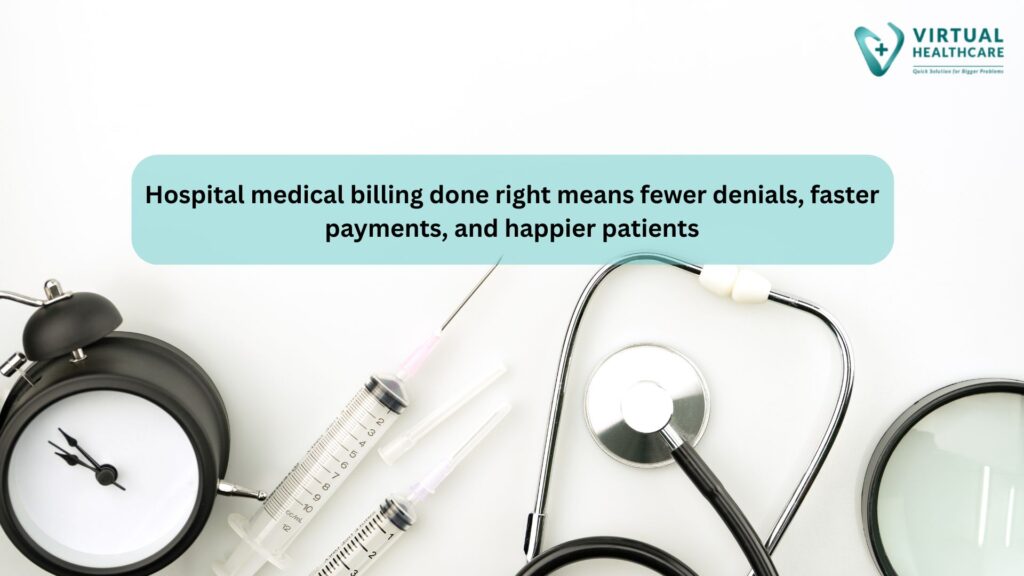Let’s be real, hospital bills can get confusing, both for patients and for hospitals. That’s where hospital medical billing and Revenue Cycle Management (RCM) step in. In simple words, RCM makes sure hospitals get paid on time and patients don’t get stuck with endless billing headaches.
Now, let’s talk about the 5 must-have RCM services every hospital should have.
Let’s Talk About RCM – Why It Even Matters
Let’s be real, when we think of hospitals, the first thing that comes to mind is doctors, nurses, and treatments, right? Beyond doctors and nurses, there’s another engine keeping things alive, money.
Hospitals aren’t any different from other businesses; they rely on payments to keep things running smoothly. But here’s the catch, it’s not as simple as handing over cash after a doctor’s visit. There are insurance companies, bills, approvals, and a whole process to make sure payments are done properly. The official term for this behind-the-scenes money process? Revenue Cycle Management.
Now, don’t let the name scare you. Think of RCM as a checklist hospitals use to make sure:
The patient’s details are correct.
- The bill is made without mistakes.
- Insurance pays up on time.
- The patient knows what they need to pay (without surprise charges).
If all of this works well, the hospital earns steady revenue, and patients don’t end up stressed about confusing bills. Win-win, right?
Service 1: Getting Patient Info Right from the Start
Think about this: you go to a hospital, and the receptionist notes your name wrong, or maybe enters the wrong insurance ID. Small mistake? Not really. Later, when your bill goes for insurance approval, it might get rejected because the details don’t match.
That’s why the very first step, patient registration and eligibility checks is so important. Hospitals need to confirm:
- The patient’s personal details are accurate.
- Their insurance actually covers the treatment.
This avoids future headaches for both sides. Nobody wants to hear, “Oops, your insurance won’t pay for this” after they’ve already had treatment.

Service 2: Hospital Medical Billing Without the Headaches
Let’s be real, the biggest piece of the puzzle is hospital medical billing.
Imagine shopping at a supermarket and finding items scanned wrong at checkout. Annoying, right? The same goes for hospital billing. Every treatment, test, or service has a special code. If even one code is typed wrong, the insurance company can deny the claim.
When billing is done properly:
- Hospitals get paid faster.
- Patients get a clear bill they can actually understand.
- There are fewer arguments about “hidden charges.”
The truth is, clean and error-free billing keeps both sides happy. Patients feel respected, and hospitals don’t waste time chasing payments.
Service 3: Dealing with Insurance Claims (The Real Game!)
Here’s where things get interesting, insurance claims.
Let’s face it, insurance companies aren’t exactly known for being fast. Even the smallest slip-up in paperwork can put your claim on pause. This is why hospitals need a strong claims management system.
Think of it like ordering a package online. You don’t just pay and forget, you track it until it’s delivered, right? Claims are similar. Hospitals need to:
- Submit the claim correctly.
- Track its progress.
- Fix errors quickly.
- Follow up if payments are stuck.
Without this follow-up, millions can get stuck in “pending” status. But with proper tracking, hospitals actually receive the money they deserve, and patients don’t get stuck in limbo waiting for their insurance.
Service 4: Tracking the Money Coming In
So the payment has finally come through, great! But now comes the next important part: payment posting and revenue tracking.
This is how hospitals keep tabs on what money has been received, what’s pending, and what’s still in dispute. Without proper tracking, hospitals might think they’re making money when in reality, some payments are still missing.
Payment posting also shows trends. For example:
- Is a particular insurance company always paying less?
- Are certain claims getting delayed too often?
By catching these patterns early, hospitals can fix problems before they turn into big revenue losses.
Service 5: Making Billing Easy for Patients
Here’s the part many hospitals overlook, patient support and financial transparency.
Patients already have enough stress dealing with health issues. If they get confusing bills filled with medical jargon, it only makes things worse.
Hospitals that explain bills in simple language, provide clear payment options, and have a helpful support team really stand out. Imagine being told:
“Here’s what your insurance covers. Here’s what’s left for you to pay.”
Clear, simple, no shocks. That’s the kind of experience patients actually appreciate. It builds trust, and trust means they’ll return to the same hospital next time too.
Final Takeaway
So, let’s wrap this up. The 5 must-have RCM services are:
- Accurate patient registration.
- Clean and clear hospital medical billing.
- Smart claims management.
- Proper payment tracking.
- Patient-friendly billing support.
When these are done right, hospitals don’t just earn more, they also build trust with patients. And honestly, healthcare isn’t just about treatment. It’s also about making the financial side smooth and stress-free.
And with Virtual Oplossing Healthcare by your side, you can finally focus on what really matters, caring for patients while we take care of your RCM.
FAQs
- What exactly is RCM in hospitals?
RCM stands for Revenue Cycle Management. It’s basically the money side of healthcare from registering patients to final payment collection. - Why is hospital medical billing so important?
Because accurate billing avoids claim rejections, ensures hospitals get paid faster, and keeps patients from receiving confusing bills. - How do eligibility checks help patients?
They confirm insurance coverage before treatment starts. This prevents the dreaded “surprise bill” later. - Does RCM really improve patient experience?
Definitely. When bills are clear and payments are smooth, patients spend less time stressing about money and more time focusing on recovery. - How is technology changing RCM?
With digital billing systems, automation, and AI tools, hospitals can now process bills faster, reduce errors, and track claims in real-time.
Copyright: All rights reserved. Unauthorized reproduction or distribution of any content on this site is prohibited. For permissions, please contact https://virtualoplossing.in/

